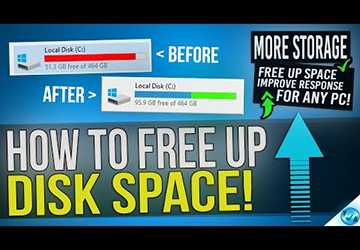7 Ways to Free Up Space on Your Overloaded Computer
When your hard drive reaches capacity, everything bogs down. Boot times could be faster to crawl, apps drag, and even simple tasks like searching for a file get noticeably laggy.
As you save and download more data, your computer must work overtime. The constant struggle for space will only get worse over time.

Entire hard drives also increase the risk of data loss. Without any open slots, saving new information means overwriting existing files. One wrong move could wipe out something important.
We've all been there—your computer's hard drive is almost full, everything is slowing down, and you can't install new programs. Digital clutter accumulates over time, and before you know it, your computer bursts at the seams.
This article will explore seven effective ways to clean up and free up precious hard drive real estate. You can get your machine running like new again with a little effort.
Let's dive in!
7 Effective Ways to Free Up Space
The effects of long-term clutter creep up on you slowly. However, reclaiming your disk space can dramatically improve the situation. Look at seven effective decluttering strategies to breathe new life into your overloaded computer.
1. Delete Unused Applications and Programs
Over the years, it's easy to accumulate software you no longer need. Uninstalling programs and apps you don't use will instantly free up space.
First, review your installed application list and remove anything you last opened over a year ago. If you are trying to decide whether to delete a particular program, try monitoring your usage for a month. Delete apps that don't get launched.
Next, review old software installers and packages taking up room on your hard drive. If the program is already installed, these are safe to trash.
2. Remove Duplicate Files
Duplicates may not seem like a big deal, but they rapidly eat up storage over time. Find and delete extra copies of photos, documents, videos, and music.
First, organize your files into folders so similar items are together. Then, use your operating system's search function to detect duplicates. For more options, you can also use a specialized duplicate file finder.
View copies and keep only the content you need. A single master file instead of 20 unused extras will clear out substantial space.
3. Clean Up Your Downloads Folder
The Downloads folder is one of the biggest clutter culprits—installers, zip files, and who knows what else gets tossed here without a second thought.
Open your Downloads folder and delete the following:
● Installers for software you've already set up
● Zip files you've already extracted
● Any other files you don't need anymore
Then, make a habit of regularly sorting and removing unneeded downloads. A little ongoing maintenance prevents piles of obsolete files.
4. Remove System Junk Files
Junk files like temporary internet caches, broken shortcuts, and error logs build up in the background, hogging space. Use the Disk Cleanup utility in Windows or a third-party cleaner app to wipe them out.
Disk Cleanup finds junk hiding all over your system, from your browsing history to your recycling bin. Select the file types you want to erase. With one click, all that space is freed up.
Schedule Disk Cleanup to run automatically every month to remove excess junk. Keeping your system lean and clean maximizes available room.
5. Clear Out Your Browser Cache
Web browser caches allow quick access to frequently visited sites. But over time, they become bloated with unnecessary temporary files.
Delete your cache and browsing history in Chrome, Firefox, or any browser you use. You can typically find this under Settings > Privacy. To free up space, set your browser to clear caches and histories automatically regularly.
Freeing up your browser cache provides an easy speed boost and clears out GBs of pointless clutter.
6. Remove Media You Don't Use
When did you last watch that random video or listen to those MP3s from 2003? Media files like photos, videos, music, and podcasts consume massive space. Be ruthless and delete anything you haven't used in years.
Here are a few tips:
Delete screenshots you don't need anymore
Remove photos and videos that are blurry, dark, or low-quality
Delete music you don't listen to anymore
Remove movies and videos you've already watched and won't replay
Regularly pruning unused media prevents them from hogging your storage. Keep only your favourites and most important files.
7. Backup and Remove Content You Don't Need
Documents, projects, and personal files accumulate without us even noticing. We save our work but forget to remove content we no longer need regularly.

Go through all non-media files, such as documents and archives. Ensure anything important is backed up in the cloud or external drive. Then, purge drafts, temporary files, and anything irrelevant you're holding onto "just in case."
Develop an organization system and routine maintenance plan so new clutter doesn't immediately take its place. With mindful storage hygiene, you will only overflow again sometime soon.
Keeping Your Computer Free of Clutter
A randomly overloaded computer leads to headaches and wasted time. However, managing your storage keeps your machine running smoothly for years.
Use these decluttering strategies to reclaim space and boost your performance. Then make them a regular habit.
Set calendar reminders to re-evaluate your storage needs monthly. Follow up on cleaning tasks before your computer reverts to its naturally cluttered state.
A lean, clean computer is a happy computer. Yours will thank you for the refresh!